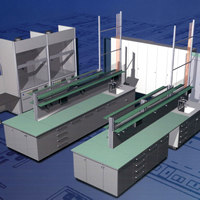Furniture Products
Furniture materials are another way to tailor and build a dependable workspace. There are several benchtop materials you can choose from depending on your budget and what kinds of chemical or environmental stressors your furniture will be exposed to daily. Some materials can withstand the most corrosive and hazardous materials, while others offer moisture resistance and require minimal cleaning effort. Lab furniture productsComprehensive product choice is the foundation of our unmatched ability to deliver the lab furniture you need, when you need it. Featured productsWhy is laboratory furniture needed?When establishing a high-functioning workspace, furniture plays a significant role in safety, the effectiveness of daily operations, and the overall comfort of your team. Without the right amount of storage and workstations, a lab can become cluttered and create bottlenecks in locating equipment or performing standard procedures. Some materials are also better suited for chemical handling, making it critical to source the proper furniture that will sustain through repeated exposure to corrosive or hazardous materials. Proper laboratory furniture optimizes safetyA well-setup workspace can mean the difference between a well-functioning laboratory and a workplace hazard. Selecting workbenches that minimize footprints in the lab can keep walkways open in the case of emergencies. Specialized furniture such as chemical cabinets and safety bins help minimize the risks of accidents in the workplace and keep table tops free for daily use. High-quality furniture supports operational function and organizationAn organized laboratory will increase productivity and ease of function in the workspace. Customized workstations and shelving can come in handy when creating a streamlined process in the lab. Well-furnished workspaces provide greater comfortSetting up a productive and health-conscious workspace starts with furniture selection. By prioritizing ergonomic furniture options, and well-spaced workstations you can create a working environment that maximizes comfort and efficiency. What are the different types of laboratory furniture?Deciding on the best products to furnish your lab can be difficult, as there are so many options available on the market today. This can become less complex when you narrow down your search to a few key factors based on your application. Stationary vs. mobile workspacesWhen deciding between stationary and mobile furniture for your lab, there are a few things to reflect on. It’s important to discern if your workspaces will be used for a multitude of procedures, or if each workstation will be specialized to optimize your process. Specialized materialsThere are benefits to selecting specific materials for your benchtop and laboratory furniture. Some materials are designed to withstand the heavy use of abrasive materials, while others are built to minimize biological contamination. Here we will focus on three of the most common benchtop materials found in a lab workspace: High pressure laminateThis stylish and affordable surface material is ideal for multipurpose workspaces that incorporate exposure to moisture or heat. Built for durability, high pressure laminate is both moisture and water-resistant, keeping furniture dry and easy to maintain. It is also known for its low heat conductivity – making it an ideal surface for handling hot labware or tools. Epoxy resinSlightly more hardy than high-pressure laminate; epoxy resins can withstand temperatures of 300-350°C. It offers resistance to environmental and moisture degradation, and resistance to a wide range of laboratory chemicals. Epoxy resin has a high mechanical strength, meaning it has significant resistance to impact from heavy equipment. The disadvantage to epoxy resin is its heavy weight and availability as a sourced material. It may require considerable lead times or custom installation depending on your laboratory needs. Stainless steelOne of the most popular laboratory furniture materials, stainless steel is perfect for creating a clean and durable laboratory workstation. Stainless steel is easy to sanitize as it is a non-porous surface making it easier to eliminate contamination. Its properties are rust-resistant, making it a versatile and long-lasting material for any lab space. In addition to being highly heat resistant, stainless steel can withstand most corrosive chemicals making it the best option for all chemistry and biomedical laboratories. Adjustable & modular optionsMany lab furniture suppliers will offer modular options, as labs may require variations in height and length to fit into the workspace properly. Workbenches and seats can be made adjustable so that they can be resized to support many laboratory applications. ConclusionWell-executed operational planning for a laboratory facility requires careful consideration of floor planning and furniture selection. A major component of this is understanding how daily procedures will require specific types of lab benches and storage containers to optimize the workflow, and keep your team from over exerting themselves. |

|
Processing your request... |


























































